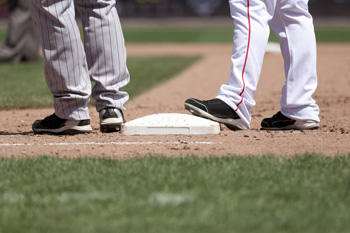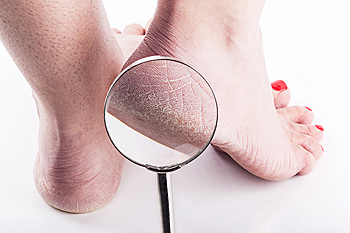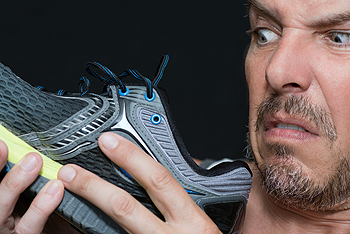Items filtered by date: September 2019
Washington Baseman Deals with Plantar Fasciitis Recovery
 First baseman Ryan Zimmerman of the Washington Nationals has suffered a “brutal” season due to plantar fasciitis in his right foot. The condition made Zimmerman’s returns to the field slow. The nature of the athlete’s injury has also made it slow to heal; fully torn plantar fascia are faster to heal, but Zimmerman’s fascia was only partly torn. Before his return on September 1st, Zimmerman rehabilitated on the treadmill. Plantar fasciitis is a common sports injury that can be disruptive to everyday life. If you think you’ve sustained a plantar fasciitis injury, contact your podiatrist.
First baseman Ryan Zimmerman of the Washington Nationals has suffered a “brutal” season due to plantar fasciitis in his right foot. The condition made Zimmerman’s returns to the field slow. The nature of the athlete’s injury has also made it slow to heal; fully torn plantar fascia are faster to heal, but Zimmerman’s fascia was only partly torn. Before his return on September 1st, Zimmerman rehabilitated on the treadmill. Plantar fasciitis is a common sports injury that can be disruptive to everyday life. If you think you’ve sustained a plantar fasciitis injury, contact your podiatrist.
Plantar fasciitis can be very painful and inconvenient. If you are experiencing heel pain or symptoms of plantar fasciitis, contact Dr. Ronald Sheppard from Warren-Watchung Podiatry Center. Our doctor can provide the care you need to keep you pain-free and on your feet.
What Is Plantar Fasciitis?
Plantar fasciitis is the inflammation of the thick band of tissue that runs along the bottom of your foot, known as the plantar fascia, and causes mild to severe heel pain.
What Causes Plantar Fasciitis?
- Excessive running
- Non-supportive shoes
- Overpronation
- Repeated stretching and tearing of the plantar fascia
How Can It Be Treated?
- Conservative measures – anti-inflammatories, ice packs, stretching exercises, physical therapy, orthotic devices
- Shockwave therapy – sound waves are sent to the affected area to facilitate healing and are usually used for chronic cases of plantar fasciitis
- Surgery – usually only used as a last resort when all else fails. The plantar fascia can be surgically detached from the heel
While very treatable, plantar fasciitis is definitely not something that should be ignored. Especially in severe cases, speaking to your doctor right away is highly recommended to avoid complications and severe heel pain. Your podiatrist can work with you to provide the appropriate treatment options tailored to your condition.
If you have any questions please feel free to contact one of our offices located in Marlboro and Watchung, NJ . We offer the newest diagnostic and treatment technologies for all your foot and ankle needs.
Medical Conditions And Cracked Heels
 The medical condition that is referred to as cracked heels occurs when the skin on the outer edge of the heel(s) becomes dry. Pressure is applied on the heels as a result of walking and standing, deep cracks, or fissures, may form on the skin. This typically causes pain and discomfort, and it may become difficult to walk. Many people who experience this condition, find that it can develop from standing for extended periods of time, or from wearing shoes that have an open back. Additionally, people may become aware of cracked heels beginning to develop if certain medical conditions exist. These can include psoriasis, dermatitis, and specific types of athlete’s foot. The skin may feel better when the feet are washed and dried thoroughly, followed by using a good moisturizer. If you have this ailment, it is advised that you speak to a podiatrist who can recommend proper treatment options.
The medical condition that is referred to as cracked heels occurs when the skin on the outer edge of the heel(s) becomes dry. Pressure is applied on the heels as a result of walking and standing, deep cracks, or fissures, may form on the skin. This typically causes pain and discomfort, and it may become difficult to walk. Many people who experience this condition, find that it can develop from standing for extended periods of time, or from wearing shoes that have an open back. Additionally, people may become aware of cracked heels beginning to develop if certain medical conditions exist. These can include psoriasis, dermatitis, and specific types of athlete’s foot. The skin may feel better when the feet are washed and dried thoroughly, followed by using a good moisturizer. If you have this ailment, it is advised that you speak to a podiatrist who can recommend proper treatment options.
Cracked heels are unsightly and can cause further damage to your shoes and feet. If you have any concerns, contact Dr. Ronald Sheppard from Warren-Watchung Podiatry Center. Our doctor can provide the care you need to keep you pain-free and on your feet.
Cracked Heels
Cracked heels appear unappealing and can make it harder for you walk around in sandals. Aside from looking unpleasant, cracked heels can also tear stockings, socks, and wear out your shoes. There are several methods to help restore a cracked heel and prevent further damage.
How Do You Get Them?
Dry skin is the number one culprit in creating cracked heels. Many athletes, walkers, joggers, and even swimmers suffer from cracked heels. Age and skin oil production play a role to getting cracked heels as well.
Promote Healing
Over the counter medicines can help, especially for those that need instant relief or who suffer from chronic dry feet.
Wear Socks – Wearing socks with medicated creams helps lock in moisture.
Moisturizers – Applying both day and night will help alleviate dryness which causes cracking.
Pumice Stones – These exfoliate and remove dead skin, which allows for smoother moisturizer application and better absorption into the skin.
Change in Diet
Eating healthy with a well-balanced diet will give the skin a fresh and radiant look. Your body responds to the kinds of food you ingest. Omega-3 fatty acids and zinc supplements can also revitalize skin tissue.
Most importantly, seek professional help if unsure how to proceed in treating cracked heels. A podiatrist will help you with any questions or information needed.
If you have any questions, please feel free to contact one of our offices located in Marlboro and Watchung, NJ . We offer the newest diagnostic and treatment technologies for all your foot care needs.
How Do I Treat My Sweaty Feet?
 People who experience plantar hyperhidrosis are often familiar with the embarrassment of having feet that sweat excessively. This can lead to an unpleasant foot odor in addition to leaving damp footprints while walking barefoot. Some patients find it beneficial to use an antiperspirant on their feet, and this may be helpful in reducing excess sweat. Research has indicated there may be positive results from using specific shoe inserts which may help to absorb sweat, in addition to sprinkling powder in the shoes. It may help to alternate wearing different pairs of shoes, and this can provide the opportunity to dry the shoes out after wearing them for the day. If you are afflicted with plantar hyperhidrosis, it is strongly advised that you consult with a podiatrist who can help you in determining the cause of this ailment, and suggest the proper treatment options.
People who experience plantar hyperhidrosis are often familiar with the embarrassment of having feet that sweat excessively. This can lead to an unpleasant foot odor in addition to leaving damp footprints while walking barefoot. Some patients find it beneficial to use an antiperspirant on their feet, and this may be helpful in reducing excess sweat. Research has indicated there may be positive results from using specific shoe inserts which may help to absorb sweat, in addition to sprinkling powder in the shoes. It may help to alternate wearing different pairs of shoes, and this can provide the opportunity to dry the shoes out after wearing them for the day. If you are afflicted with plantar hyperhidrosis, it is strongly advised that you consult with a podiatrist who can help you in determining the cause of this ailment, and suggest the proper treatment options.
If you are suffering from hyperhidrosis contact Dr. Ronald Sheppard of Warren-Watchung Podiatry Center. Our doctor can provide the care you need to attend to all of your foot and ankle needs.
Hyperhidrosis of the Feet
Hyperhidrosis is a rare disorder that can cause people to have excessive sweating of their feet. This can usually occur all on its own without rigorous activity involved. People who suffer from hyperhidrosis may also experience sweaty palms.
Although it is said that sweating is a healthy process meant to cool down the body temperature and to maintain a proper internal temperature, hyperhidrosis may prove to be a huge hindrance on a person’s everyday life.
Plantar hyperhidrosis is considered to be the main form of hyperhidrosis. Secondary hyperhidrosis can refer to sweating that occurs in areas other than the feet or hands and armpits. Often this may be a sign of it being related to another medical condition such as menopause, hyperthyroidism and even Parkinson’s disease.
In order to alleviate this condition, it is important to see your doctor so that they may prescribe the necessary medications so that you can begin to live a normal life again. If this is left untreated, it is said that it will persist throughout an individual’s life.
A last resort approach would be surgery, but it is best to speak with your doctor to find out what may be the best treatment for you.
If you have any questions please feel free to contact one of our offices located in Marlboro and Watchung, NJ . We offer the newest diagnostic and treatment technologies for all your foot and ankle needs.

